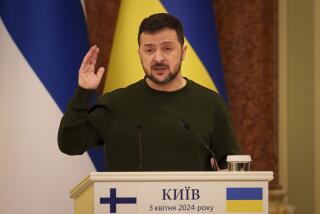Ukraine Counterspy Leads an Anti-Nuclear Mission
- Share via
KIEV, Ukraine — Col. Oleksandr Skipalsky hasn’t found any nuclear terrorists so far. But whenever a train hauling tactical nuclear devices sets off on the long journey from Ukraine to Russia, his mission is to make sure none are lurking in the woods along the way.
As chief of Ukraine’s new military counterintelligence department, Skipalsky must prepare for the unpredictable, ferreting out potential terrorists, drug addicts or political fanatics who could threaten the security of the train’s cargo.
“We have a very tight schedule,” said the 46-year-old career KGB officer in a matter-of-fact interview about an extraordinary process.
Ukraine’s decision to hand over to Russia by July 1 all of the 4,000-odd tactical nuclear weapons based in its territory has led to a “concentrated movement of nuclear weapons” that the colonel calls unprecedented.
The Ukrainian Parliament, which declared independence last Aug. 24, called for the new country to become nuclear-free, and Ukrainian officials are delighted that half of the nuclear devices have already been removed to Russia.
The operation hit some snags in mid-autumn, just when Parliament here passed laws establishing Ukraine’s armed forces. “Some military commanders didn’t exactly block the weapons’ removal, they simply didn’t cooperate,” Skipalsky explained.
That was when no one seemed to really be in charge. The “central authority” of Moscow was already a misnomer, but the Ukrainians still hadn’t established their own institutions. In fact, Skipalsky’s job--”securing the safety of military formations in Ukraine”--used to bypass local authorities entirely.
“The special divisions of the KGB that guarded nuclear weapons answered directly to Moscow,” says Skipalsky, a counterintelligence professional who has served on nuclear sites in Siberia and the Far East. But now that Ukraine has taken over the republic’s big KGB apparatus, renaming it the National Security Service of Ukraine, Skipalsky answers directly to Kiev. That pleases him.
Skipalsky cuts a distinguished figure. His gray eyes match the Soviet military uniform that still hasn’t been changed and he has an engaging smile that mirrors the new accessibility of what used to be an off-limits department.
Still, his candor has limits. He is cagey about the number of his men. “Enough,” he says. Some are new recruits, but most are like Skipalsky--old cadres who kept the same jobs but switched employers by swearing loyalty to Ukraine.
His department also has the same problems that plague other Ukrainian institutions carved from the old centralized, decrepit system. “We have no office equipment, no faxes, not even a tape recorder,” he complains.
Nonetheless, Skipalsky leaves no doubt that the job of removing tactical nuclear weapons is getting done according to the schedule worked out by Ukraine and Russia late last year. Priority has been given to removing weapons from units that have taken the oath of loyalty to Ukraine.
When a convoy sets out, carrying no more than a few dozen nuclear weapons at a time because “any more would be dangerous,” everyone on a “need to know” basis--”from President (Leonid) Kravchuk, to the leader of a local government, to the chief of the railroad”--goes on alert, Skipalsky says.
He confirms that the nuclear devices, which can be as small as eight inches long for an artillery shell, are protected by integral electromagnetic locks, which disable the devices if the wrong code is entered. Each one is stored in a special canister for extra security.
The weapons are shipped exclusively by rail because, as anyone who has taken an automobile trip in the former Soviet Union can attest, the roads are abysmal. “On the railroads, we can check the quality of the rails and look for oncoming trains more easily,” explained Skipalsky.
The process has been running smoothly--with one exception. Skipalsky accuses Adm. Igor Kasatonov, commander of the Black Sea Fleet, of not following the schedule for removing naval nuclear weapons from the Crimea.
“He keeps delaying,” says Skipalsky, who thinks that Kasatonov “is keeping them as a bargaining chip.” As long as the Black Sea Fleet possesses nuclear weapons, Kasatonov can argue that it is a strategic force that must remain united under joint Commonwealth command, rather than passing to Ukraine’s control.
More to Read
Sign up for Essential California
The most important California stories and recommendations in your inbox every morning.
You may occasionally receive promotional content from the Los Angeles Times.













